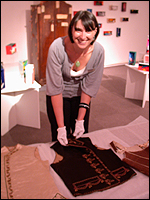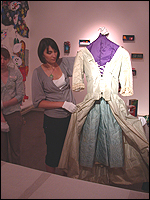Tunbridge Wells Museum and Art Gallery
June 2008
The core of Tunbridge Wells Museum’s costume collection was acquired during the
1950s by its dedicated curator, Edith Bradley.
Now the collection boasts 7,500 pieces including textiles. The cramped museum premises
has one costume case for display with a maximum of six costumes on show at any one
time. The rest is in store. It was to see some of these stored treasures that members
of the Costume Society travelled to the town one sunny day in June.
The discovery of the Chalybeate Spring in 1606 was fundamental in the birth of Tunbridge
Wells and its subsequent development as a favoured resort of the gentry and royalty
during the seventeen and eighteenth centuries. Many of the donations to the Museum
have come from the families of people who settled in the fashionable town and formed
the town’s character and reputation as a pleasant place to live, work and visit.
After projecting images of the star pieces of the collection, Jo Wiltcher, acting
Museum
Jo Wiltcher of Tunbridge Wells Museum
with an unusual black silk gentleman's
embroidered waistcoat

Manager and Lindsay Speight, Visitor Services Assistant whisked off the protective
covering from the dozen or so items they had selected for us to see.
White gloves
were distributed and members were free to examine at will.
Jo explained that the collection includes many very beautiful evening gowns including
a good collection of beaded dresses from the 1920s. Unfortunately for the curators,
the donations arrived with very little information. One wedding dress is thought,
stylistically, to date from 1740 although the donor stated it was worn in 1797.
Costume society members conjectured that the 1797 bride might have been wearing
her grandmothers hand-me-down.
1740’s Wedding Dress

Menswear was represented by a good collection of embroidered waistcoats from the
Georgian and Regency period, including one unusual black silk example. We were then
thrilled to see in the storage box, at least a dozen other examples.
Childrenswear, rural workwear, corsets and other structural wear are all represented
in the collection and the museum keeps up to date with 2lst century underpinnings
by way of Wonderbra.
Tunbridge Wells is yet another example of a small town museum with limited display
space yet safeguarding its social history with a distinctive collection of clothing
reflecting the fashions of its colourful past.
It was a pleasure to visit the town and thanks must go to Imogen Stewart for arranging
the visit and Jo and Lindsey at the Museum for giving up so much of their time to
ensure that we went away with a lasting impression of the wealth of costume history
being cared for by one of our smaller museums.